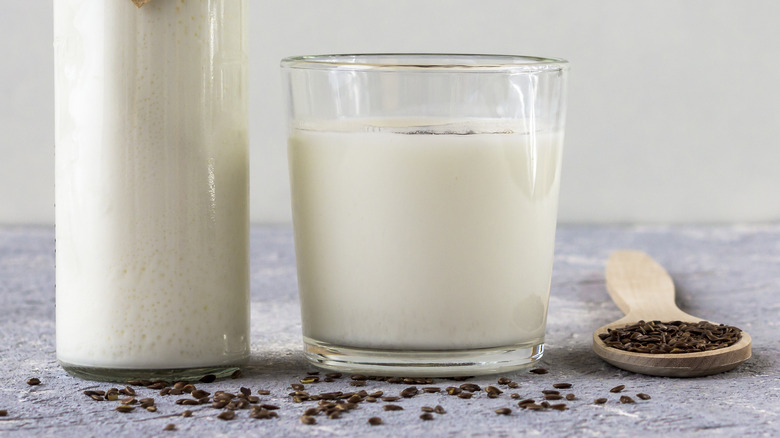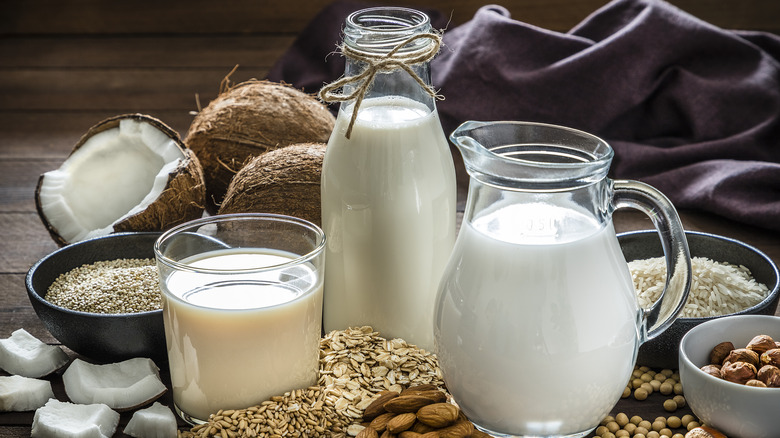This Plant-Based Milk Has The Least Amount Of Protein
While milk's claim to fame may be its calcium content, it packs a punch in terms of protein, too. In 1 cup of whole milk, you'll find 8 grams of protein, reports the U.S. Department of Agriculture (USDA). That's more than the 7 grams you'll find in one serving of smooth, unsalted peanut butter (2 tbsp), another food source highly praised for its protein content (via USDA).
While whole milk and other widely consumed milks are predominantly dairy-based, plant-based milk alternatives have been growing in popularity in the U.S. in recent years. So much so that Statista reports that milk-alternatives have become a 3-billion-dollar industry. With almond milk occupying the majority of sales, oat milk, soy milk, and coconut milk follow close behind.
There are numerous other types of milk substitutes that you may not have even been aware of. This includes cashew milk, pea milk, rice milk, hemp milk, flax milk, and much more. However, you won't find the same amount of protein in all plant-based milks. Therefore, it's important to know which types may be lower in protein content than others to ensure you're getting plenty of this essential macronutrient from other sources.
Flax milk contains no protein whatsoever
Derived from flaxseeds, flax milk is rich in omega-3s, according to experts at Parade. Because of this, flax milk is purported to support our cardiovascular health. In 1 cup of flax milk, the USDA reports that you'll find 300 milligrams (mg) of calcium, 149 milligrams of phosphorus, and 2% of your total daily value of iron. What you won't find, however, is one iota of protein. Zip, zero, none.
That being said, you can find protein in some flax milk products if manufacturers add it in. "[S]ome brands of flax milk contain additional protein with pea protein or add in extra vitamins and minerals like calcium or vitamin D," registered dietitian Mackenzie Burgess tells Parade. As a high-quality, plant-based protein, pea protein is exactly what it sounds like: protein that has been extracted from pisum sativum, or green peas, according to 2022 research published in the scientific journal Molecules. Pea protein consumption has been linked with a lower risk of diabetes, heart disease, and cancer due to its anti-inflammatory and antioxidant properties.
Rice milk and coconut milk are also low in protein
But is flax milk the only kind of plant-based milk lacking in protein? Rice milk and coconut milk aren't terribly far behind. In 1 cup of rice milk, you'll find only 0.68 grams of protein (via USDA) and just a smidgen over 0.5 grams of protein in 1 cup of coconut milk (via USDA). Therefore, if you're a fan of flax, rice, or coconut milk, just be sure you're getting enough protein from other places, such as beans, vegetables, nut butters, or tofu if you're looking to stay plant-based.
Now for the million-dollar question. Which plant-based milk harbors the greatest amount of protein? While there is some debate as to the answer, soy milk and pea milk appear to be the top contenders. In 1 cup of soy milk, the USDA states that you'll get 6.34 grams of protein. However, registered dietitian Stephanie Wells notes via Thyme To Go Vegan that some soy milks may contain anywhere between 7 and 10 grams of protein. Similarly, an 8-ounce cup of Ripple's Original Plant-Based pea milk has 8 grams of protein (via Ripple Foods). While the numbers may vary slightly depending on the brand, it's clear that soy milk and pea milk both have a lot to offer when it comes to protein-rich, plant-based milks.



